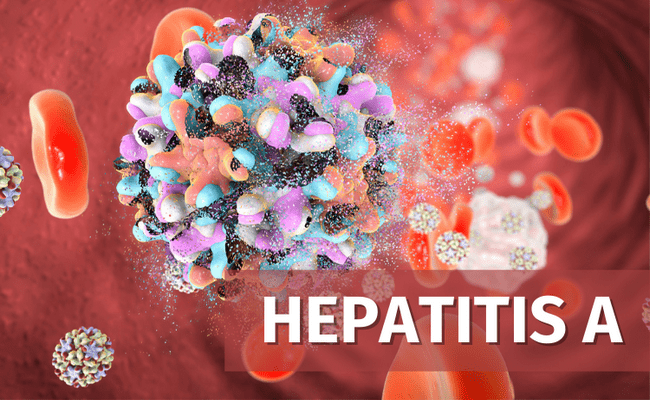Definition of Hepatitis A:
Hepatitis A is an acute infectious disease caused by hepatitis HAV.

Agent’s Factors of Hepatitis A:
- Agent: Causative agent is HAV.
- Resistance: The virus is resistance to heat and chemical.
- Reservoir of infection: Human cases only.
- Period of infectivity: 2 weeks before and 1 week after the onset of jaundice.
- Infective materials: Human faeces, Blood, Serum and body fluids.
Host Factors of Hepatitis A:
- Age: All age groups can be affected. More frequent among children than adult.
- Sex: Both sexes can be equally affected.
Mode of Transmission of Hepatitis A:
- Faeco oral route,
- Parenteral route (through blood or contaminated by needle),
- Sexual route.
Incubation period: 2 – 6 weeks
Sign and Symptoms of Hepatitis A:
Symptoms may be mild or even no symptoms, but the person faeces are still infectious to others. The usual features are:
- A short, mild, flu-like illness: Fever, chills, malaise and fatigue,
- Nausea, vomiting and diarrhea,
- Loss of appetite,
- Weight loss,
- Dark urine and jaundice,
- Itchy skin,
- Abdominal pain.
Investigation of Hepatitis A:
- Anti HAV,
- Serum bilirubin,
- SGPT and SGOT.
Treatment of Hepatitis A:
There is no specific treatment for HAV. The disease is self-limiting and returns to normal within a couple of months. Only severely affected patients need hospitalization. General plan of treatment are
- Bed rest,
- Diet:
- Protein restricted and no spicy foods
- Light diet supplemented by fruits, plenty of fluids, ORS, dab water and glucose drinks.
- If severe vomiting: IV fluid and anti-emetic.
- Drugs: Sedatives, hypnotics, and diuretics, are usually avoided. It diuretics are to be used potassium sparing diuretics should be used.
- Clinical and biochemical follow up.
How to Prevent and Control Hepatitis A Virus?
Preventive and controlling measures of HAV:
1. Proper sanitation:
- Proper excreta disposal,
- Improving water supply,
- Maintenance of hygiene (personal and environmental),
- Sanitary improvements of food stores and kitchen.
2. Health education about:
- Proper disposal of excreta,
- Use of safe drinking water and sanitary latrine,
- Food handlers should be educated in matters of food hygiene,
- Adequate breast feeding and improved weaning practices.
3. Timely control of epidemics: By strengthening of epidemiological surveillance systems.
4. Screening of blood donors for HAV.
5. Vaccination: Vaccine for HAV is available but not for HEV.
6. Fly control: Controlling breeding of flies in association with faeces and dirty water.

Maria Khatun Mona is a Founder and Editor of Nursing Exercise Blog. She is a Nursing and Midwifery Expert. Currently she is working as a Registered Nurse at Evercare Hospital, Dhaka, Bangladesh. She has great passion in writing different articles on Nursing and Midwifery. Mail her at “maria.mona023@gmail.com”
